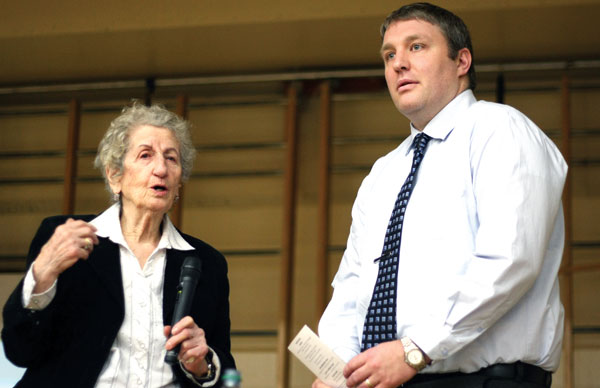Holocaust Survivor speaks to Hughenden Public School students

A gym full of Hughenden School students, as well as students from the Highland View Colony School, staff, and various community members felt themselves extremely honoured to listen to the incredible story of courage and resilience by 89-year-old Eva Olsson, a survivor of the holocaust and a concentration camp from WWII.
Her story is incredibly moving and brought many in the audience to tears.
Olsson’s message is that we remember the extreme consequences of what hate and intolerance can do.
Frequently, throughout her presentation, Olsson told her audience, “Being successful as a human being is the way you treat others, with compassion.”
The audience was touched by her story of bullying to the extreme, the horrific genocide plotted by Adolf Hitler, which was worsened by the inaction of bystanders.
At 19-years old, Olsson was led to believe that her destination was work in a brick factory when she was ordered to walk seven kilometers to board a train’s box car, packed like sardines with hundreds of other Jews.
She told students that many on the train collapsed, or even died, as they fought for oxygen over the long train ride from Szatmar, Hungary.
One small pail of water was all there was for over 100 people, she said, while another pail was to be used as a toilet.
While on the train Olsson remembers seeing her 49-year-old mother squatting down in a corner hugging her grandchildren.
Olsson was very close to her mom and shared with us how she’d asked “Why are you crying, mom?” The reply was “I’m not crying for me, I’m crying for all of the children. I have lived.”
Olsson vividly remembers and described how she became aware of a terrible, nauseating stench in the air as she took her first breaths upon arrival at the platform where a sign said Auschwitz.
There was massive turmoil and screaming by people on the platform.
The sky was black, with billowing smoke from tall chimneys, and a barbed wire fence ensured no one would escape; guards armed with machine guns were everywhere.
Olsson joined a line of terrified people, with her dead sister’s niece and her mother, and was oblivious that it would be the last time she would ever see her mother, and many other members of her family.
Josef Mengele, Nazi officer and physician, the Angel of Death as he was called, was at the head of the line and silently gave his orders by either pointing left or right. Life or death.
Those going left, included her mother and small niece entered a gas chamber.
Olsson reported that it often took 20 minutes for the occupants to die from suffocation by cyanide gas; with children dying first.
She said there were terrifying screams and moans before the gas chamber was silenced.
When the doors were opened by the guards, hundreds of corpses, many of which were babies with their heads crushed by the weight of their dead parents, was what was left of many loved ones.
Olsson was clearly moved by the recollection of the traumatic memories in her retelling.
Olsson reported that as dead women were pulled out of the chamber, their heads were cut off and the human hair was removed, shipped to Germany to manufacture socks for soldiers manning the U-boats.
The rest of the corpses were burned, hence the stench that Olsson noticed upon her arrival.
Olsson uses her story of the Holocaust and its extreme examples of hate, bigotry, and inaction of onlookers, in an attempt at getting members of the audience to understand that it is always a bad thing to hate.
“To some people hate is a joke,” she said. “There are no innocent bystanders; instead they are as guilty as the perpetrators.
“Hitler could not have got away with what he did without the bystanders,” she said, wiping her eyes.
“He was the ultimate bully.”
Olsson told students, “Hate is a killer. Hate murdered one-and-one-half million children.”
She said those who were spared from the cyanide endured absolutely ‘horrific medical research’ by Mengele.
This included sewing together twins by their backs and then injecting them with tuberculosis, typhoid and other diseases; exposing them to radiation and high voltage.
Olsson also reported that “they made sure that the females would never bear a child, and that males would never father one.”
Heart-wrenching symbols of the Holocaust for Olsson, she said, were all the shoes – empty.
Jews had to give up their shoes so that they could be sent, along with their clothes, to Germany.
Some Jews were even ordered to line up on the bank of the river, naked, where they were shot and then pushed into the river.
Olsson said women holding their babies would have a bullet fired through the baby first which then would go into the mother in order that the soldiers could save ammunition.
Others were confined as slaves in prisoner of war camps.
Olsson remembers eating bread made from sawdust and drinking the dirty water that was used to peel potatoes.
Her clothes were taken, as were everyone’s.
She said there were no bathroom facilities and no toilet paper.
Often they would have to sleep in the same place as their fecal matter.
Olsson remembers how her health became poorly leading to her contracting Typhus.
She shared how when her fever became very bad, she’d remembered that her mom had treated a fever with a wet flannel. Having no water, she said, “I would pee-pee on the flannel and hold it to my forehead.”
Olsson is to be admired for her incredible resilient spirit.
She told students, “Nazis stripped me of absolutely everything. except my will to survive.”
On Apr. 15, 1945, at 11 a.m. Olsson, along with her prison mates, were freed by British and Canadian soldiers.
We are grateful that Olsson shared her story with us and her journey back to the hell of the Holocaust, where she ended her silence of the horrors of her past. Everyone in attendance left humbled by the story she shared.
Olsson says she is committed to end injustice, and foster attitudes of peace, tolerance, and equality through sharing her experience.
She reminded students and adults that family is very important, and so is unconditional love.
Through sharing her story she hopes that those who did not survive Hitler’s wrath would be remembered.
“Eleven million voices were silenced by hate,” she sadly reported.
Appreciation is extended to NewAlta of Hughenden for organizing and helping to sponsor the presentation.
SUBMITTED Article









